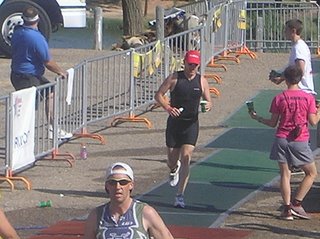



Relaxing a bit before we head to dinner after playing in the pool (post race) with Meg and Cam and thought I would recap todays race. Overall the day went well for me. Finished just under 5 hours with a time of 4:57!!! With an overall possition of 135 out of 837 athletes.
I was hoping to go 4:30 or better, but it just wasn't part of the plan today. The weather started cooler than normal with some wind and cloud cover. The swim went so fast, I was amazed as I turned at the last buoy that the finish was there. I felt real strong during the swim and came out of the water at :27 mins. The bike was very challenging even thought it didn't warm up until the last 17 mile of the 56 mile ride. There were a total of 8 serious climbs on the bike course. All of them were steep enough to keep me in my granny gear and my pace under 10 mph. I really noticed the wind as well on the course. It really zapped my power. I was hoping to be off the bike around 2:30, but finished the ride at 2:44. Still not bad for the conditions and the course. My fueling worked great on the ride and I was pleased at my hydration / nutrition strategy something that I really have struggled with in the past, so that was a break through for me (YIPPIE!!!!) Hey – you have to look at these things as half full!!! I came off the bike feeling great, I mean it was an awesome feeling to run as if I hadn't even road. OK – that might be stretching it a bit, but I was feeling solid, very solid. I came off the bike in 180th position and after the run I was in 135th. So you do the math – I passed a ton of people on the run a total of 45. That is a great feeling given that this race drew some huge competition. I ran the 1st mile easy getting my legs and my rythum and then set a pace that was sub-threshold but very do able for the 13.1 miles. I felt solid through out. There were a total of three very challenging hills on the run. My strategy for hilly ½ Ironman runs is to stick to my pace until my Heart Rate hits my threshold, then I walk until my HR drops 5 beats below. I did this on the 1st and 2nd hills then on the last hill at mile 10, I decided to charge up the hill but managed to stay at my threshold. I felt great about how I faired on the run. A little part of me, a very little part feels that I didn't hit the run hard enough, but I feel very good about my ½ marathon split of 1:41 on such a demanding course. During the run the temperature rose and I definitely felt the old core temp rise. But I have suffered through much worse. It was a very mild day for this race that usually experiences temperatures in the triple digits. I previewed the run yesterday and was excited about the layout of the course. I look forward to coming back and giving it another shot someday.
The best thing about this race was having my wife and kids there with me. Their support and encouragement is everything. I could not continue to compete if it wasn't for their commitment and sacrifice. I especially love to run down the finish shoot with my children Megan and Cameron. Cam missed out on this one, I think he was playing in the dirt :-)
Overall – God is good, very good. I have a great peace about this race and how it went. I have done 100's of endurance events, but this was the first race that my #1 goal was to #GLORIFY GOD and enjoy him. I really felt that today! I also really felt the presence of prayer during my 5 hour race. I give thanks to my Lord and King for the many relationships that he has blessed me with and as hard as this may seem to understand, a piece of them were with me today!
So there you have it! Another race in the life of Kevin! I look forward to a restful / active recovery week traveling with my family to the Grand Canyon then to the Valley of the Sun to see my brother Jason and Family!
Loving the Suffering of Life and Sport -
Kevin
HERE ARE MY SPLITS FROM THE RACE!!!
SWIM 27:41
BIKE 2:44:43
RUN 1:41:34
OVERALL 4:57:32
POSITION 135
RACE LEG SWIM
DISTANCE 1.2 mi.
PACE 1:27/100m
POSITION144
TOTAL (27:41)
TOTAL BIKE
DISTANCE 56 mi.
PACE 20.40 mph
POSITION 180
TOTAL (2:44:43)
TOTAL RUN
DISTANCE 13.1 mi.
PACE 7:45/mile
POSITION 135
TOTAL (1:41:34)


